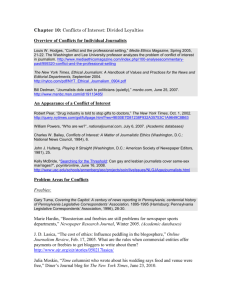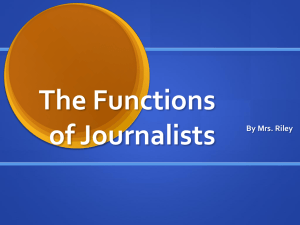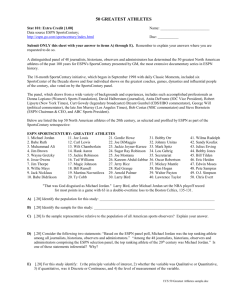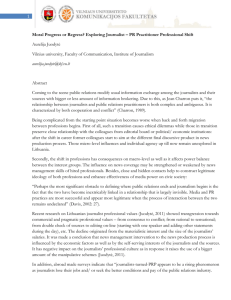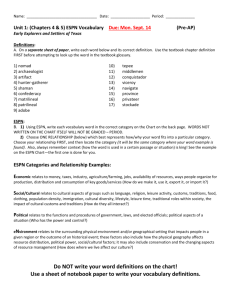Chapter 10: Conflicts of Interest: Divided Loyalties
advertisement
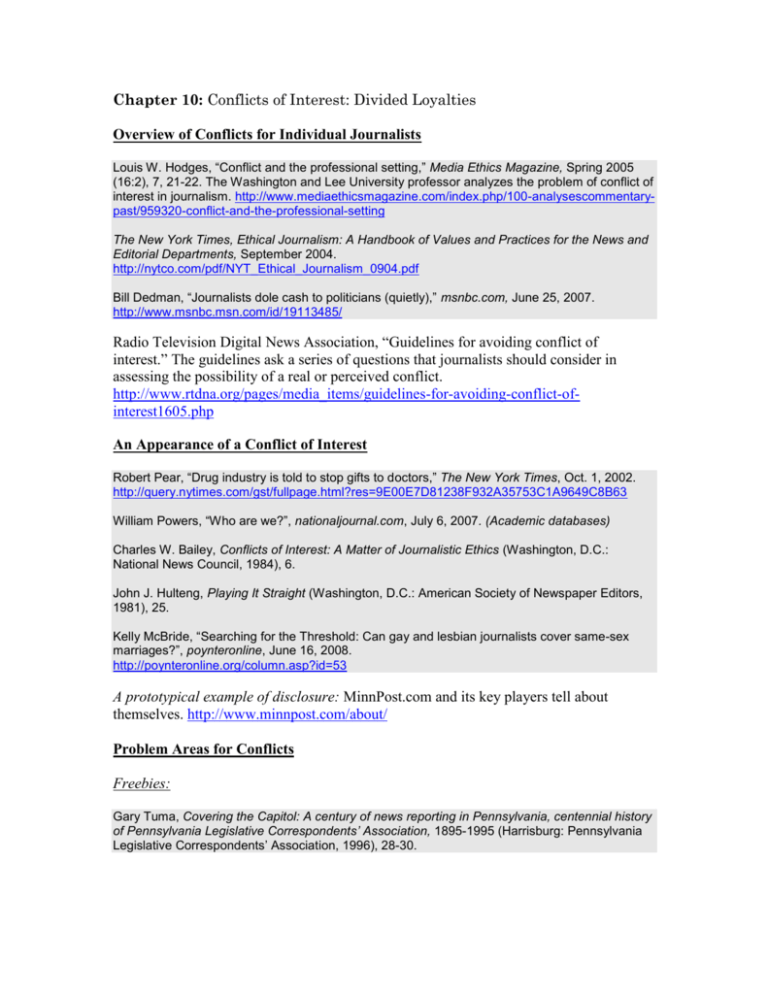
Chapter 10: Conflicts of Interest: Divided Loyalties Overview of Conflicts for Individual Journalists Louis W. Hodges, “Conflict and the professional setting,” Media Ethics Magazine, Spring 2005 (16:2), 7, 21-22. The Washington and Lee University professor analyzes the problem of conflict of interest in journalism. http://www.mediaethicsmagazine.com/index.php/100-analysescommentarypast/959320-conflict-and-the-professional-setting The New York Times, Ethical Journalism: A Handbook of Values and Practices for the News and Editorial Departments, September 2004. http://nytco.com/pdf/NYT_Ethical_Journalism_0904.pdf Bill Dedman, “Journalists dole cash to politicians (quietly),” msnbc.com, June 25, 2007. http://www.msnbc.msn.com/id/19113485/ Radio Television Digital News Association, “Guidelines for avoiding conflict of interest.” The guidelines ask a series of questions that journalists should consider in assessing the possibility of a real or perceived conflict. http://www.rtdna.org/pages/media_items/guidelines-for-avoiding-conflict-ofinterest1605.php An Appearance of a Conflict of Interest Robert Pear, “Drug industry is told to stop gifts to doctors,” The New York Times, Oct. 1, 2002. http://query.nytimes.com/gst/fullpage.html?res=9E00E7D81238F932A35753C1A9649C8B63 William Powers, “Who are we?”, nationaljournal.com, July 6, 2007. (Academic databases) Charles W. Bailey, Conflicts of Interest: A Matter of Journalistic Ethics (Washington, D.C.: National News Council, 1984), 6. John J. Hulteng, Playing It Straight (Washington, D.C.: American Society of Newspaper Editors, 1981), 25. Kelly McBride, “Searching for the Threshold: Can gay and lesbian journalists cover same-sex marriages?”, poynteronline, June 16, 2008. http://poynteronline.org/column.asp?id=53 A prototypical example of disclosure: MinnPost.com and its key players tell about themselves. http://www.minnpost.com/about/ Problem Areas for Conflicts Freebies: Gary Tuma, Covering the Capitol: A century of news reporting in Pennsylvania, centennial history of Pennsylvania Legislative Correspondents’ Association, 1895-1995 (Harrisburg: Pennsylvania Legislative Correspondents’ Association, 1996), 28-30. Marie Hardin, “Boosterism and freebies are still problems for newspaper sports departments,” Newspaper Research Journal, Winter 2005. (Academic databases) J. D. Lasica, “The cost of ethics: Influence peddling in the blogosphere,” Online Journalism Review, Feb. 17, 2005. What are the rules when commercial entities offer payments or freebies to get bloggers to write about them? http://www.ojr.org/ojr/stories/050217lasica/ Julia Moskin, “Time columnist who wrote about his wedding says food and venue were free,” Diner’s Journal blog for The New York Times, June 23, 2010. http://dinersjournal.blogs.nytimes.com/2010/06/23/time-columnist-who-wrote-about-hiswedding-says-food-and-venue-were-free/ Patrick Gavin, “Journos’ favorite junket,” Politico, July 1, 2010. The Distilled Spirits Council of the United States, takes journalists to such locales as France, Mexico and Scotland to taste fine liquor. http://www.politico.com/click/stories/1007/journos_favorite_junket.html Secondary income: David Folkenflik, “Herald publisher quits, reporters reinstated,” National Public Radio, March 11, 2008. This is about the case of the El Nuevo Herald reporters who received pay for work for Radio Marti. http://www.npr.org/templates/story/story.php?storyId=6189886 Joe Flint, “News anchors’ cameo roles could dent their credibility,” The Wall Street Journal, Feb. 2, 2005. Portraying a journalist in television dramas could come at a cost. (News databases) Paul Farhi, “Research firm offers cash for journalists’ opinions on oil, gas industries,” The Washington Post, Dec. 16, 2010. A New York research firm offered a $250 “honorarium” for answering questions that could help the firm shape an advertising campaign. The firm’s director said: “It’s ironic that journalists depend on people to give them opinions but aren’t as forthcoming with their own.” http://www.washingtonpost.com/wpdyn/content/article/2010/12/16/AR2010121606215_pf.html Arthur S. Brisbane, “Public Editor’s Journal: Times curbs Pogue’s P.R. appearances,” The New York Times, July 6, 2011. After tech columnist David Pogue spoke before the Media Relations Summit, a public relations conference, a video of his speech was marketed. That led The Times to prohibit Pogue, a freelancer, from any speeches in which he advises “individuals or organizations how to deal successfully with the news media.” http://publiceditor.blogs.nytimes.com/2011/07/06/times-curbs-pogues-pr-appearances/ Armstrong Williams case: Greg Toppo, “Education Dept. paid commentator to promote law,” USA Today, Jan. 6, 2005. www.usatoday.com/news/washington/2005-01-06-williams-whitehouse_x.htm. Howard Kurtz, “Writer backing Bush plan had gotten federal contract,” The Washington Post, Jan. 26, 2005. http://www.washingtonpost.com/wp-dyn/articles/A36545-2005Jan25.html. Howart Kurtz, “Bush urges end to contracts with commentators,” The Washington Post, Jan. 27, 2005. http://www.washingtonpost.com/wp-dyn/articles/A39872-2005Jan26.html. Jim Drinkard and Mark Memmott, “HHS said it paid columnist for help,” USA Today, Jan. 27, 2005. http://www.usatoday.com/news/washington/2005-01-27-hhs_x.htm. Greg Toppo, “Commentator says he may return fees,” USA Today, Oct. 7, 2005. www.usatoday.com/news/washington/2005-10-03-williams-fees_x.htm. GregToppo, “Pundit Armstrong Williams settles case over promoting education reforms,” USA Today, Oct. 22, 2006. www.usatoday.com/news/washington/2006-10-20-williams_x.htm. A reporter’s personal relationships: Jack Shafer, “Extreme ethical hygiene at The New York Times,” Slate, Oct. 13, 2010. The Times said in an editors’ note that columnist Joe Nocera should not have written about a case in which one party is represented by the law firm that employs his wife as director of communications. Shafer disagrees. http://www.slate.com/id/2271144/ Taking a Public Position on Issues in the News Bob Steele, “A Pledge of Allegiance for journalists,” poynteronline, Sept. 20, 2001. Should news organizations display their spirit of patriotism during these extraordinarily difficult times. Should journalists wear their support of their country on their sleeves? http://www.poynter.org/content/content_view.asp?id=5897 Edward Schumacher-Matos, “Reporter-columnists tread fine line with readers’ trust,” The Miami Herald, April 25, 2010. The newspaper’s ombudsman questions whether reporters who write news stories should also write columns in which they express their opinions about the events and people they cover. http://newsombudsmen.org/columns/reporter-columnists-tread-fine-line-with-readerstrust Clark Hoyt, “Keeping their opinions to themselves,” The New York Times, Oct. 19, 2008. The public editor analyzes reader allegations of bias in political coverage. http://www.nytimes.com/2008/10/19/opinion/19pubed.html Kathryn S. Wenner, “Conflicts of interest: San Francisco Chronicle tech columnist Henry Norr is fired after he participates in an anti-war rally,” American Journalism Review, May 2003. http://www.ajr.org/article_printable.asp?id=3004 Bob Steele, “When opposition becomes participation,” poynteronline, Feb. 21, 2003. http://www.poynter.org/column.asp?id=36&aid=21425 “Seattle Times editor elaborates on newsroom cheering memo,” Romenesko Misc., Aug. 15, 2007. http://www.poynter.org/latest-news/romenesko/84040/seattle-times-editor-elaborates-onnewsroom-cheering-memo/ Paul Duke, “E-mail undoing,” American Journalism Review, September 2002. Should a Florida editor have lost her job after sending a reader a politically charged note? www.ajr.org/article_printable.asp?id=2599 Howard Kurtz, “Post critic Page apologizes for e-mail remarks to Barry aide,” The Washington Post, Nov. 13, 2007. Tim Page, a music critic, sent an intemperate message to the mayor’s office after receiving an unsolicited press release. http://www.washingtonpost.com/wpdyn/content/article/2007/11/12/AR2007111201906.html Brian Stelter, “Newsman to speak at events of group opposed to health care plan,” The New York Times, October 28, 2009. John Stossel, who hosts a weekly program on Fox Business Network, delivered speeches in three Arkansas cities for the Americans for Prosperity. http://www.nytimes.com/2009/10/28/business/media/28fox.html?_r=1 Kevin Woster, “KOTA anchorman temporarily sidelined after tea party appearance,” Rapid City Journal, April 27, 2010. The South Dakota television journalist was taken off the air after a speech at a Citizens for Liberty tax day rally. http://www.rapidcityjournal.com/news/article_a0740daa-5237-11df-afea001cc4c03286.html Linda Greenhouse speech at Harvard: David Folkenflik, “Critics question reporter’s airing of personal views,” National Public Radio, Sept. 26, 2006. A report on Linda Greenhouse’s comments in a speech at Harvard. http://www.npr.org/templates/story/story.php?storyId=6146693 Byron Calame, “Hazarding personal opinions in public can be hazardous for journalists,” The New York Times, Oct. 8, 2006. www.nytimes.com/2006/10/08/opinion/08pubed.html Radcliffe Institute for Advanced Study, Harvard University, “Radcliffe Institute Medalist 2006: Linda Greenhouse,” June 9, 2006. Text of the speech by the New York Times reporter. http://www.radcliffe.edu/alumnae/radday2006_greenhousespeech.aspx# Postings on social media: Stephanie Gleason, “Going public: Should journalists express their political views on social networking sites?”, American Journalism Review, December/January 2010. The author surveys opinion on the question, noting that journalists have traditionally avoided taking public positions on the news. The author frames the debate with another question: “[D]oes that uncompromising stance make any sense in the freewheeling digital age, marked as it is by the impassioned political debate of the blogosphere and an almost religious commitment to transparency?” http://www.ajr.org/Article.asp?id=4846 John Morton, “Staying Neutral: Journalists should not reveal their political views, Twitter or no Twitter. http://www.ajr.org/Article.asp?id=4837 Joe Strupp, “New [Wall Street Journal] conduct rules target Twitter, Facebook,” Editor & Publisher, May 13, 2009. (News databases) Joe Strupp, “Tweet and sour? Newspapers set new rules for social networking,” Editor & Publisher, June 15, 2009. Many editors are not sure how to police the growing Twitter trend and Facebook “friending” phenomenon. (News databases) See also the references in Chapter 18 under “Ethics Issues in Web Journalism.” Civic Activities David Folkenflik, “Citizen Jayne: Baltimore’s best TV journalist believes she can balance her onair reporting and her off-camera activism. But should she?” The Sun, Feb. 25, 2001. (news databases) Greg Braxton, “TV reporter Lu Parker plays by her own set of rules,” Los Angeles Times, Oct. 21, 2010. “The KTLA reporter is dating L.A. Mayor Antonio Villaraigosa, advocating for causes and promoting herself in ways that critics say is a problem for her professional reputation. Parker says media standards have to change with the times.” http://articles.latimes.com/2010/oct/21/entertainment/la-et-lu-parker-20101022 Relationships With Sources Phil Sheridan, “Baseball writers wrong to exercise their right to vote,” The Philadelphia Inquirer, Oct. 8, 2005. Discusses the Baseball Writers of America’s longtime involvement with baseball’s Hall of Fame. (News databases) The Associated Press, “AP made call with poll’s integrity in mind,” espn.com, Dec. 21, 2004. AP refuses to allow BCS to use its poll in compiling college football bowl rankings. http://sports.espn.go.com/ncf/news/story?id=1951112 Max Frankel, The Times of My Life and My Life With The Times (New York: Random House, 1999). Frankel discusses the question of critics’ and sportswriters’ voting on awards for the people they cover, 515-516. Kate Zernike, “Between journalist and advocate: The Amanda Knox case,” The New York Times, Oct. 7, 2011. This article was written after an Italian court freed Amanda Knox, an American exchange student who had been convicted of killing her roommate. Zernike writes that journalist Nina Burleigh gave numerous television interviews after the court’s decision in which she vehemently defended Knox. According to Zernike, “Ms. Burleigh sseemed at times to move from journalist to advocate, treading what she knew, as a longtime reporter and author, was a dangerous line.” http://www.nytimes.com/2011/10/09/fashion/between-journalist-and-advocate-theamanda-knox-case.html?pagewanted=all Roni Caryn Rabin, “Conflicts of interest may ensnare journalists, too,” The New York Times, Nov. 22, 2008. By accepting industry-sponsored awards and relying on corporate public relations offices, health reporters may become entangled in the same kind of ethical conflicts they often expose. http://www.nytimes.com/2008/11/22/health/22journalists.html?ref=health Howard Kurtz, “Journalists say their White House advice crossed no line,” The Washington Post, Jan. 29, 2005. Two conservative commentators privately offered advice to aides of President George W. Bush; they said it was perfectly proper conduct for commentators. http://www.washingtonpost.com/wp-dyn/articles/A46077-2005Jan28.html Case Study No. 5: Covering Police, Wearing Their Uniform Joe Kimball, “Working as a cop, she’ll keep a Lowe profile,” The Star Tribune, July 18, 2003. (News databases) Brian Lambert, “Reporter-turned-copy walks thin blue line,” The Pioneer Press, July 22, 2003. (News databases) Lambert, “Reporter conflict is in the eye of the beholder,” The Pioneer Press, July 25, 2003. (News databases) Case Study No. 6: Carrying the Torch, Stirring Controversy Lee Benson, “Torch run just isn’t conflicting,” Deseret News, Jan. 9, 2002. (News databases) Case Study No. 8: A Love Triangle on the Evening News Duke Helfand and Steve Hymon, “Mayor reveals romantic link with TV newscaster,” Los Angeles Times, July 4, 2007. (News databases) Duke Helfand and Meg James, “Telemundo reassigns mayor’s girlfriend,” Los Angeles Times, Sept. 25, 2007. (News databases) Shawn Hubler, “The mayor and his mistress,” Los Angeles Magazine, May 2008. [News databases] Additional Case Studies A son’s decision: The 20-year-old son of Ethan Bronner, chief of The New York Times’ Jerusalem bureau, enlisted in the Israeli military. Bronner’s critics portrayed this as a conflict of interest for the reporter and called for The Times to reassign him. Executive editor Bill Keller declined to do so, although the paper’s public editor, Clark Hoyt, thought Bronner should have been reassigned to avoid the appearance of conflict. [See separate file in this folder.] NPR fires Juan Williams: The senior news analyst lost his NPR job in October 2010 over a comment he made about Muslims on Fox News, which NPR said violated NPR’s ethics policies. Fox News responded by expanding Williams’ role on its network and giving him a multiyear contract. David Folkenflik, “NPR dismisses news analyst Juan Williams,” Oct. 21, 2010. http://www.npr.org/templates/story/story.php?storyId=130732174 “NPR fires Juan Williams; Fox News expands his role,” Fox News, Oct. 21, 2010 (includes video). http://www.foxnews.com/politics/2010/10/21/npr-fires-juan-williams-oreillyappearance/ “NPR’s firing of Juan Williams was poorly handled,” NPR ombudsman’s column, Oct. 21, 2010. http://www.npr.org/blogs/ombudsman/2010/10/21/130713285/nprterminates-contract-with-juan-williams Leonard Pitts Jr., “Firing scandal: National Public Radio’s mistaken rush to judgment,” The Miami Herald, Oct. 27, 2010. (News databases) http://www.miamiherald.com/2010/10/27/1893689/mistaken-rush-to-judgment.html Rem Reider, “Moving too fast: NPR’s mishandling of the Juan Williams imbroglio,” American Journalism Review, September 2010. http://ajr.org/Article.asp?id=4957 Endorsements by ESPN personalities: The cable network’s sideline reporter Erin Andrews endorsed Reebok shoes on Jan. 4, 2011, two weeks after delivering an oncamera criticism of a competitor’s shoes during the Rose Bowl game. In February, ESPN arranged with the Poynter Institute to scrutinize its content and practices, and in April, the network announced new endorsement guidelines. The Poynter ombudsman team declared the guidelines to be too flexible. Allan Brettman, “ESPN's Erin Andrews endorses Reebok shoe, two weeks after her damaging report on Nike football shoe,” The Oregonian, Jan. 25, 2011, updated Jan. 27, 2011. http://blog.oregonlive.com/playbooksandprofits/2011/01/espn_reporter_erin_andrews _end.html Richard Sandomir, “Several ESPN broadcasters have had shoe contracts,” The New York Times, Feb. 14, 2011. http://www.nytimes.com/2011/02/15/sports/15espn.html Kelly McBride, “Straight to the point,” Poynter Review Project, March 23, 2011. http://m.espn.go.com/wireless/story?storyId=6248772 Norby Williamson, ESPN Executive Vice President, Production, announces the company’s new endorsement guidelines, April 13, 2011, with link to full text. http://frontrow.espn.go.com/2011/04/endorsement-policy/ Kelly McBride and Regina Combs, “So close, yet so far/ESPN moved the ball with its new endorsement guidelines, but ultimately came up short,” Poynter Review Project, April 20, 2011. http://sports.espn.go.com/espn/columns/story?id=6399130 MSNBC suspends Keith Olbermann: The Countdown anchor was suspended for two days in November 2010 after the network became aware of contributions he made to two Arizona members of congress and an unsuccessful Senate candidate in Kentucky. Simmi Aujila, “Olbermann suspended after donating to Democrats,” Politico, Nov. 5, 2010. http://www.politico.com/news/stories/1110/44734.html David Carr, “Olbermann, impartiality and MSNBC,” The New York Times, Nov. 7, 2010. http://www.nytimes.com/2010/11/08/business/media/08carr.html Keith Olbermann, “A statement to the viewers of Countdown,” Nov. 9, 2010. http://www.scribd.com/doc/41623358/A-Statement-to-the-Viewers-of-Countdown Michael Kinsley, “The absurdity of Olbermann’s sin,” Politico, Nov. 9, 2010. http://www.politico.com/news/stories/1110/44855.html Helen Thomas retires after anti-Israel remarks: The 89-year-old Hearst Newspapers columnist stepped down after making remarks in May 2010 that Israeli Jews should “get the hell out of Palestine and return to Germany or Poland “or wherever they came from.” Judith Miller, “Why are we tolerating Helen Thomas’ journalistic hypocrisy?”, FoxNews.com, June 7, 2010. http://www.foxnews.com/opinion/2010/06/07/judith-miller-helen-thomas-gazamiddle-east-israel-pat-buchanan-hamas/ Sam Youngman and Emily Goodin, “Helen Thomas quits after Israel remarks,” The Hill.com, June 7, 2010. http://thehill.com/homenews/administration/101731-helen-thomas-announcesretirement Robert Sheer, “On the vilification of Helen Thomas, The Huffington Post, June 9, 2010. http://www.huffingtonpost.com/robert-scheer/on-the-vilification-ofhe_b_605573.html Should journalists be banned from the Stewart-Colbert rallies? Several news organizations cautioned journalists that attending could give the appearance of bias. Michael Calderone, “News outlets caution staffers about Stewart-Colbert events,” Yahoo.com, Oct. 14, 010. http://news.yahoo.com/s/yblog_upshot/20101014/cm_yblog_upshot/news-outletscaution-staff-about-stewart-colbert-events Dana Davis Rehm, “Why can’t NPR staff go to ‘Rally to Restore Sanity’ or “March to Keep Fear Alive’?”, blog of the NPR communications department, Oct. 13, 2010. http://www.npr.org/blogs/thisisnpr/2010/10/13/130549777/why-can-t-npr-staff-go-tostewart-s-rally-to-restore-sanity-or-colbert-s-march-to-keep-fear-alive Bob Garfield and Brooke Gladstone, “Journalists as people,” a transcript from “On the Media,” NPR, Nov. 5, 2010. http://www.onthemedia.org/transcripts/2010/11/05/03
